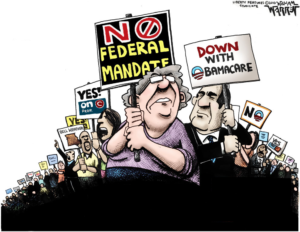“[T]he repeal debate is, and should be, over.”
That was Barack Obama taking a victory lap on his signature health care law last month, telling the American people what everyone else on Capitol Hill already knows: Obamacare is not going anywhere.
Whether it is House Speaker John Boehner (R-Ohio) after the 2012 election proclaiming on ABC News that “Obamacare is the law of the land,” or more recently House Republican Conference Chair Cathy McMorris Rodgers (R-Wash.) telling the Spokesman Review editorial board last month that the law is “probably” here to stay, the writing on the wall is unmistakable.
Republicans are not going to fight to get our health care system back to the way it was before. Like so many entitlements and other government programs, they have accepted the basic premise of spending hundreds of billions subsidizing health insurance policies.
More than 80 million Americans aged 26 to 64 years old making less than $46,000 not already on Medicaid now qualify for Obamacare, whether through Medicaid or the insurance exchanges, based on data from the U.S. Census and the Center for Medicare and Medicaid Services.
In the process, a brand new political constituency is being created all but guaranteeing the law will never be repealed. With the debate shifting away from repeal and whether there should be any subsidies, the question will forevermore be about how much more in subsidies will everyone receive.
Yet, despite the cynicism up on the Hill at the moment, there is still a chance, albeit a slim one, to undo the law before its costs ultimately sink the Ship of State.
By far the largest obstacle to legislatively repealing the law is reaching 60 votes in the Senate. Republicans have never had a filibuster-proof majority in the U.S. Senate since the advent of Rule XXII establishing cloture 97 years ago and, if history holds, they likely never will.
So, they have to get around the filibuster.
That is where reconciliation comes into play. Using arcane budget rules, Republicans could in principle repeal much of Obamacare via a budget resolution that would only require 51 votes to pass in the Senate, and not 60.
One window for getting it done will be in 2015, provided Republicans win the Senate and House this year. But even then, Obama would undoubtedly veto any such effort. Republicans will lack the necessary two-thirds majorities in both houses to overcome the veto.
That leaves 2017, and then it only comes into play if they can win the White House and keep control of Congress through the 2016 elections. There’s a lot of if in that plan.
If Republicans lose the White House again in 2016, the next opportunity for repeal would not come up again until after the 2020 elections. By then, Obamacare will have been the law of the land for a decade.
Does anyone expect that after 10 years, with trillions of health insurance subsidies out the door, suddenly Republicans will show up and roll back Obamacare and take those subsidies away?
All of the above argues for taking action sooner, whether via a continuing resolution or debt ceiling measure, to use Congress’ power of the purse to extract concessions from the White House on the law.
Alas, Republicans already abandoned that strategy last year when the brief partial government shutdown ended. That would have been an opportune time to press the issue, just as the crappy rollout of Obamacare, rife with website access problems, was taking place.
Instead, the Washington, D.C. establishment put a stop to the shutdown, and leaned on the program’s early deficiencies to predict the law would somehow go away on its own.
“Obamacare is going to collapse on its own,” syndicated columnist Charles Krauthammer proclaimed on Fox News’ Special Report with Bret Baier.
No, it’s not. 8 million people have already signed up for their freebies, with millions more still on the way. Now what? The window of opportunity is collapsing.
Robert Romano is the senior editor of Americans for Limited Government.







